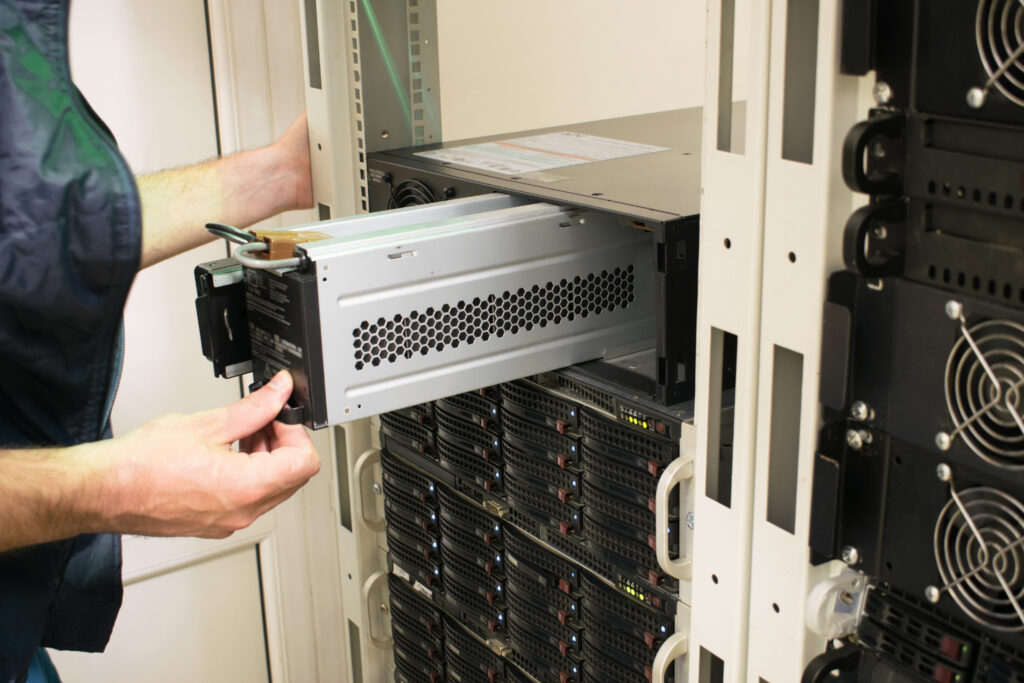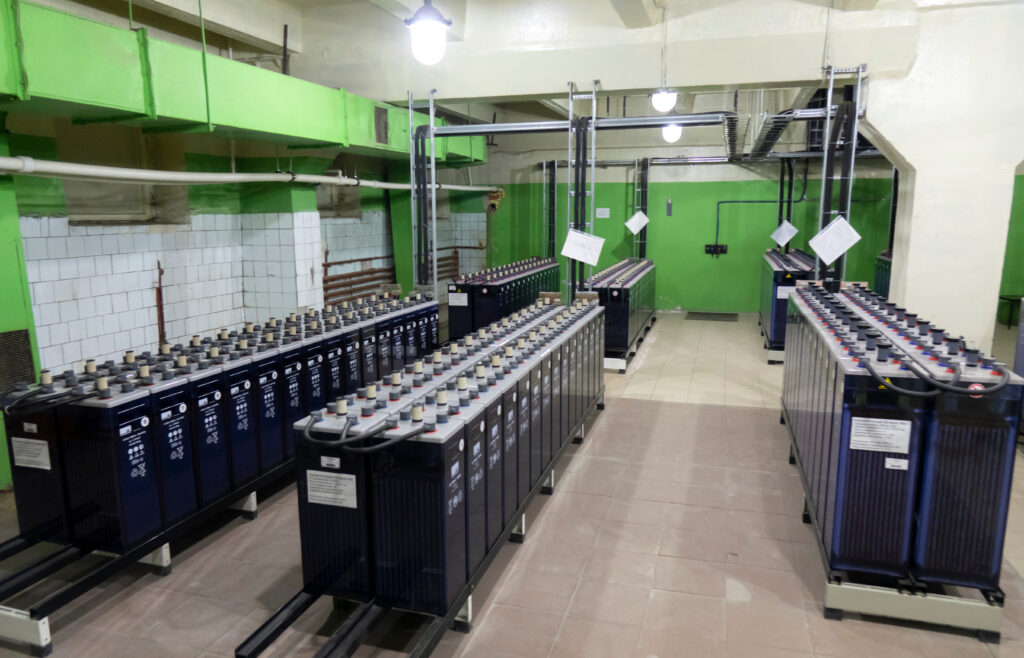UPS Battery Backup Buyers Guide
UPS Battery Backup Buyers Guide
A UPS, or uninterruptible power supply, is a device that provides backup power to protect electronic equipment from power outages, surges, and spikes. UPSs come in a variety of sizes and types and can be used to protect everything from small home office computers to large data centres.
Elements of a UPS System
There are four main elements of a UPS system:
- Rectifier: This converts the AC power to DC power using diodes.
- UPS Battery: The battery is the heart of the UPS. It provides the backup power that protects your equipment in the event of a power outage. There are three main types of UPS batteries; Valve-regulated lead-acid (VRLA), Vented lead-acid (VLA) which are also called flooded-cell batteries and Lithium-Ion batteries. There are also several different brands of these batteries available:
- The Inverter: The inverter converts the DC bus to AC power that electronic load/equipment need to operate.
- Static Bypass Switch: This is an electronic switch that allows power flow to bypass the UPS, in the event of a failure in the UPS circuit (rectifier, inverter or battery). The static bypass allows you to continue using your equipment without interruption despite potential component damage within the UPS circuit.

A Short Overview of UPS Battery Types
Being the most important part of your UPS system, it’s best to know about what battery types to consider. Each UPS battery has recommended uses in specific environments and/or applications.
Valve Regulated Lead Acid (VRLA)
Both Gel and AGM VRLA Batteries – these are the most common batteries to be found in UPS systems today. They require minimal maintenance and have a long service life, however, they typically cost more than flooded lead-acid batteries and have a lower tolerance for deep discharges. VRLA technology has a high resistance to vibrations and shock.
To view our range of AGM VRLA Batteries click here.
To view our range of GEL VRLA Batteries click here.
Flooded Lead Acid (FLA)
Flooded Lead Acid Batteries – are a type of lead-acid battery which is commonly used in UPS systems. They require maintenance and topping up with distilled water, they are commonly referred to as wet batteries, as they are filled with liquid electrolyte. FLA batteries are reliable proven technology, have an extremely long service life and are relatively inexpensive compared to other types of UPS batteries. FLA technology are more tolerant of operating environment temperature fluctuations, than their VRLA counterparts.
To view our range of Flooded Lead Acid Battery range click here.
Lithium-Ion Batteries
Lithium-Ion batteries are an expensive alternative in comparison with VRLA or flooded batteries, however they have lower operational expense costs, longer design life. Lithium-Ion batteries generally employ less real estate when installed, are lighter in weight than lead acid and have high charge and discharge acceptance due to a low internal resistance. Battery management systems are important for safe operation of Lithium-Ion batteries.
To view our range of Lithium-Ion Batteries click here.
So, what industries and applications need backup power?
There are several industries that require backup power. The most common are:
- Power Stations: Power generation, distribution and industrial process control are critical to providing our community with safe and reliable power. Changing demand for the power network to be robust and resilient ensures technologies are constantly evolving.
- Data centres: Data centres often house critical IT infrastructure, such as servers, storage devices, and networking equipment. A power outage can disrupt or even destroy this infrastructure, leading to data loss and downtime.
- Telecoms: Telecommunications companies need backup power to keep their networks running during a power outage. This is essential for businesses and individuals who rely on telecommunications services, such as phones, internet, and TV.
- Electrical Grid Utilities: Power grids need backup power batteries to ensure that power is readily available even when there are disruptions to the main power supply or in case of a power outage. Not only do they help when there is a problem with power supply they also help to reduce any stress if demand is particularly high.
- Solar & Renewables: UPS batteries can be used to store the energy generated from solar panels or other renewable sources like wind turbines, meaning that when there is no electricity running through them they are still able to function as an emergency backup for when and if you need one.
- Manufacturing: Manufacturing plants often use large amounts of energy to operate their machinery and equipment. A power outage can cause significant damage to this equipment and lead to production delays.
- Financial institutions: Banks and other financial institutions need backup power to keep their operations running during a power outage. This is essential for ensuring that financial transactions can continue uninterrupted.
- Government agencies: Government agencies, such as police departments, fire departments, and emergency management agencies, need backup power to keep their critical systems running during a power outage. This is essential for ensuring that they can continue to provide essential services to the public.
- Critical infrastructure: Other critical infrastructure, such as water treatment plants, and wastewater treatment plants, also need backup power to ensure that they can continue to operate during a power outage.
- Medical: Hospitals and any other healthcare facilities need backup power to ensure that any life-saving equipment and systems can continue to operate during a power outage.
In addition to these industries, there are many other applications that require backup power. Schools, universities, and other educational institutions also need backup power to ensure that they can continue to operate during a power outage. And even homes and apartments may need backup power in case of a power outage, especially if they have medical equipment or other critical appliances.

What should you consider when planning the design of a UPS system?
When choosing a UPS, there are a few factors you need to consider:
- Power requirements: The size of your power consumption / load is the total amount of power that your equipment draws. You need to choose a UPS that has a capacity that exceeds the size of your load.
- The environment: Where the UPS system will be located, basement, or outhouse?
- Type of mounting system needed: This will either be a rack or a tower mount depending on spacing and individual power requirements.
- The amount of runtime: The amount of runtime is the amount of time that a UPS will provide backup power in the event of a power outage. Designing a UPS that has enough runtime to allow you to safely shut down your equipment.
- The features: UPSs come with a variety of features and options, such as network monitoring, remote shutdown, and hot-swappable batteries. Choose a UPS that has the features needed to protect your equipment and keep your business running smoothly.
- Will you need to scale the size of the system in the future? Consider whether you may need more space or capacity in the future, and plan ahead.
- UPS maintenance: Do you have a facilities manager to maintain the battery system or will you need to outsource maintenance? (Considering the cost of battery systems, a maintenance contract is a smart idea to ensure that batteries operate as per specification)
How to look after your UPS batteries and will you need surge protection?
To prolong UPS and Battery life we recommend:
- Keeping the area around the UPS system and batteries clean and free of dust.
- Ensure that the battery is properly ventilated and cooled. Overheating will shorten battery lifespan and could be hazardous.
- Check or install surge protection to protect your UPS from power surges and check the voltage regulator. Line-interactive UPS systems will have a voltage regulator, which will be able to adjust any high or low voltage, reducing the reliance on the battery and lengthening service life.
- Book maintenance checks to ensure the system continues to run smoothly.
What is surge protection?
Power surges can happen at any time and can damage or even destroy electronic equipment. A power surge is a sudden spike in the power voltage. A surge protector is a device that can safeguard equipment from damage by absorbing or redirecting any surplus power. It allows the excess electricity to flow safely through to the earth.
Most UPS systems come with built-in surge protection, but to be safe, you can also install a dedicated surge protector to ensure full protection. Surge protection devices are an important part of any power system, as they can help to prevent damage to sensitive electronic equipment. When choosing a surge protector, you should consider the following factors:
- Voltage rating: The voltage rating of a surge protector indicates the maximum voltage that it can withstand.
- Current rating: The current rating of a surge protector indicates the maximum current that it can handle.
- Response time: The response time of a surge protector indicates how quickly it can react to a power surge.
It is important to choose a surge protector that has a voltage rating, current rating, and response times that are appropriate for the electronic equipment that you are protecting.
Tips for buying a UPS system
Here are a few tips for buying a UPS:
- Compare batteries and systems before purchase: There are a lot of different UPSs on the market, so it’s important to compare different models before you buy, BSH has a range of different UPS & Battery options to consider and compare. These power systems can be costly, ensure you choose the service option along with your system purchase.
- Get professional advice: If you’re not sure which UPS is right for you, talk to our professional team. We can help you choose the right UPS for your application and budget.
- Buy from a reputable dealer: When you buy a UPS, make sure you buy from a reputable dealer. This will ensure a quality product and warranty is guaranteed.
Battery Service Hub Pty. has a range of UPS batteries that are high quality and offer excellent performance from industry-leading manufacturers. For a specialist projects, please talk with our team, who can plan, design, supply, build and maintain a UPS system.



